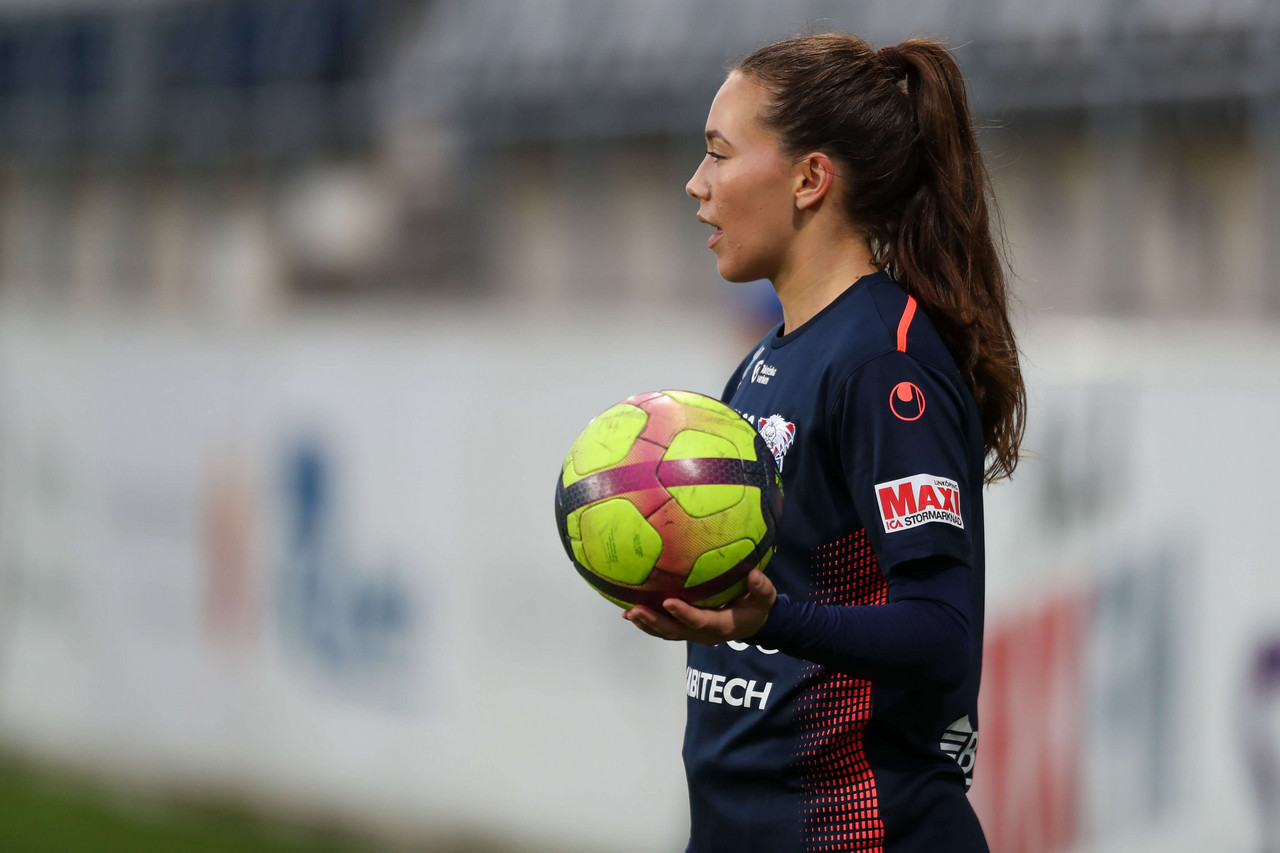Elin Landström is not just a professional football player, she is also an educated lawyer and has been practising law on the side of her sports career. She may not be the most outspoken football player when it comes to social media platforms but when talking to her, it's safe to say that she holds a strong passion for fundamental problems and challenges within the growth and development of women's football.
-
Growing in Umeå
One issue many have actualized is that it's hard for youths and children to find role models within women's football. Landström is humble when she says that she feels privileged to have been grown up in Umeå;
"Although the range of role models is more prominent today than it was when I grew up, I feel privileged. Umeå played in the Champions League and several of the players were playing in the national team."
Embed from Getty Images
“I could watch my idols live every week when they played. Hanna Ljungberg, Malin Moström, Frida Östlund and Hanna Marklund, to name a few of them. And then, when I was older, I got to play with them."
Landström made her debut in the Damallsvenskan in 2010 and featured in 16 matches for Umeå. In 2016 she signed for Göteborgs FC where she played two seasons before joining that year's reigning Swedish champions, Linköpings FC. In Linköping, she has worked hard to develop, and this season has been a regular starter becoming an essential part of the team's starting formation at her left-back role.
-
A special season
Football has been different all over the globe this year due to Covid-19. With no supporters in the stands, the Swedish teams have played the 2020 season that is close to its end. Linköping find themselves in a spot in the Champions League, with their closest contenders, Kristianstads DFF. Linköping who are 6 points behind with two rounds left to play.
"I believe in us. To play the Champions League is important, both for us players and for the club. Linköpings FC is a club that should play in that tournament."
In Sweden, the clubs were allowed to have 50 fans in the stands and it’s said to be a limit of 300 from November 1st, but regional restrictions will keep the limit of 50 in a couple of areas until the end of the season. Landström still feel that the 50 people that are allowed to come and cheer on their team truly make a difference;
"At first, it was weird to play without anyone in the stands. But then, you get used to it. What I have learned is that 50 people really can make a difference. To have them cheering in the stands has made me thinking; Oh, this is what it's like to have supporters back in the stadiums. I can't wait to have all of them back for real. Hopefully, we'll get to see it during 2021."
-
Equality in football
The question of equality in the game is something Landström is passionated about. She had the opportunity to meet the culture and sports minister, Amanda Lind, in Sweden after a debate of whether or not men's football really should've gotten the most of the government's money as support when Covid-19 hit football hard this spring. Around 96% of the money was given to men's football clubs in Sweden and 4% to women's clubs.
"You can do it like that if you want to make it easy for yourself, but it's not just the question of equality that is important here. The goal with the support of the government was to help football at this level survive,” Landström said.
"It is also a question of attitude towards the women's game. A lot of people talk about the fact that it is the market that steers this wheel, but you can influence it. Take the sponsors, for example; they give the clubs money to sponsor the game, but what do they want in return? They can put pressure on the clubs to work harder to provide both men and women with the same conditions."
Landström has a strong will to provide to the younger generation in fear of what they might face heading into a career within women’s football if certain things don’t improve and develop.
"I feel that it is my responsibility to do what I can. I feel that because I feel such gratitude to those before me. Like those players in Umeå that built the foundation for my generation; I want to make things better for the generations that come next."
Since 2016 Landström has been a member of the board in the Swedish Players Association and uses her passion for the game to improve the conditions for female football players. Not long ago, she was hired as a Player Legal Manager. While players around her use their social media platforms to fight for equality, Landström takes action behind the scenes to fight for herself, her colleagues and the next generation.
"I sometimes wish that I was a person that felt comfortable using social media as a platform to speak about these kinds of issues, but at the same time, I know that there are people out there that do and they do it great. I admire players like Megan Rapinoe and Magdalena Eriksson, for example."
"I think both of them are fantastic to speak and spread important messages while using their platforms. Not only regarding issues within football, but also when it comes to other essential subjects that need to be talked about. I have a lot of respect for them, and I am happy about the fact that there are players of that calibre that chose to do that!" Landström finishes.









































